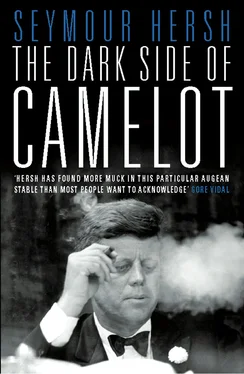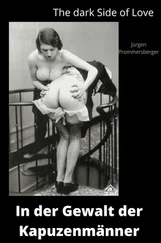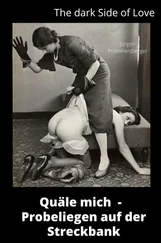Jack Kennedy once explained to Arthur Schlesinger, as Schlesinger recorded in A Thousand Days , that his father “held up standards for us, and he was very tough when we failed to meet those standards. The toughness was important.” Kennedy brought his father’s toughness and his history into the presidency, and with them he brought a sense that he, like his father, understood how the world really worked. It was an understanding that the earnest young businessmen, government officials, and academics in the Kennedy administration could never have—and it increased their awe and reverence for the president. Joe Kennedy’s street-hardened past became, ironically, further proof of Jack Kennedy’s qualifications for the Oval Office.
* Kennedy was accompanied on the high-profile London trip by James Roosevelt, the son of the newly elected president, who had star quality abroad. Kennedy, then forty-five years old, and Roosevelt, just twenty-seven, had become close friends during the 1932 presidential campaign. It was a friendship based on Roosevelt’s weaknesses for liquor and women and Kennedy’s ability to exploit weakness.
* Kennedy’s recklessness in these years extended, not surprisingly, to his womanizing. Shortly after Prohibition ended in 1933, he began an affair with a Broadway showgirl named Evelyn Crowell, who was the widow of Larry Fay, a notorious and fashionable New York gangster who, at his height of power in the 1920s, maintained a lavish mansion and gave lavish parties in Great Neck, New York. The dapper Fay, who began his career as a bootlegger but soon moved into extortion, became the model for the gangster in the F. Scott Fitzgerald classic The Great Gatsby . Fay was shot to death in 1932. Three years later, Kennedy’s affair with Fay’s widow made it as a blind item into Walter Winchell’s widely read New York Journal-American gossip column: “A top New Dealer’s mistress is a mobster’s widow.” Winchell’s longtime assistant, Herman Klurfeld, who wrote most of Winchell’s columns for thirty years, said in an interview for this book that Kennedy, who was an expert at dealing with the press, arranged a meeting with Winchell after publication of the item. The two men quickly became friends, Klurfeld said, and Kennedy eventually became one of Winchell’s key sources. Although no such evidence exists in the case of Winchell, Kennedy’s “friendship” with many journalists—such as Arthur Krock, the revered Washington bureau chief of the New York Times —was predicated on the fact that Kennedy provided them with the equivalent of money: lavish gifts and prepaid vacations and, in the case of Krock, women.
* Clancy said his job at first was to investigate various real estate properties and businesses for Kennedy, beginning with a Chicago company that was for sale. “I spent a week,” Clancy said, before returning to report to Kennedy at his summer home in Hyannis. Kennedy began the meeting by telling his new employee what he was about to report: “For ten minutes he sat there and told me what I was going to tell him. He even had the sequence right. I thought this is the smartest son of a bitch I’ve ever met.”
* During Prohibition, Zwillman and Reinfeld operated out of Newark what the federal government later determined was the nation’s largest bootlegging operation, responsible at its height for as much as 40 percent of illicit liquor sales. Reinfeld, who later changed his name to Renfield, went on after Prohibition to become a successful and legitimate liquor importer; Zwillman committed suicide in 1959, while facing a subpoena from the Senate Permanent Investigations Subcommittee, whose chief counsel was Bobby Kennedy. It was, as we will see, Zwillman and Reinfeld who bought Joseph Kennedy’s Somerset Importers in 1946.
* Kefauver certainly understood the importance of Fusco’s testimony. Kefauver’s handwritten notes for the day of Fusco’s testimony include references to Cassara and his ties to Somerset Importers. The senator, who took notes only on the testimony of key witnesses, filled six pages of his notebook with remarks and comments on Fusco. Kefauver’s papers are on file at the University of Tennessee at Knoxville.
* Timilty and his senior aides in the police department were specifically accused of protecting in the early 1940s the vast gambling syndicate of Harry J. “Doc” Sagansky, the boss of New England’s largest numbers racket. At his height, Sagansky, who lived in the Boston suburb of Brookline, employed an estimated three thousand people in his illicit rackets. He also owned numerous nightclubs and three racetracks, leading the Kefauver Committee to describe him as “perhaps the principal gambling racketeer in the New England area prior to … his conviction … in 1943.” The committee also reported that Sagansky worked closely with Frank Costello and was in daily telephone communication with him through 1942, when Timilty’s alleged protection of the racketeer was at its height. The initial indictment of Timilty was quashed in June 1943, but Timilty was reindicted. The second charge was dropped after a judge in Boston somehow ruled that Timilty only “administered” the police department and did not “enforce the law” or participate in arrests, as specified in the indictment. Timilty’s term as police commissioner ended in November 1943.
* Edward K. Linen of Rye, New York, who retired in 1979 as secretary of Todd Shipyards, confirmed in an interview for this book that Kennedy did hold a “sizable” amount of stock in the firm while serving as chairman of the Maritime Commission. “It was in Eddie Moore’s name,” Linen said. “I was assistant secretary of Todd at the time and Moore was a trustee for Joe Kennedy. Kennedy’s name did not appear” on any document. Asked how he learned about the Moore-Kennedy connection, Linen recalled only that John D. Reilly, who was president of the shipyard in the 1930s, “was a friend of Joe Kennedy’s and, at some point, I found out that Eddie Moore was Joe Kennedy.” Kennedy’s use of Moore to mask his stock purchases was made more insidious by the fact that he seemed to be completely aboveboard in disclosing his stock holdings to the White House and to Congress prior to his Senate confirmation to the Maritime Commission. In a series of March 1937 letters on file at the Roosevelt Library, Kennedy acknowledged that one of the family trusts, over which he had no control, owned 3,300 shares of stock in Todd. He also acknowledged personal ownership of an additional 1,100 shares in Todd, and proposed turning those shares over to his broker for sale within sixty days. In a letter to the Senate, Kennedy forthrightly promised to put the stock “beyond my control … before taking the oath of office. I think an understanding of these facts will clear my position much more satisfactorily, at least in my own mind.” There is no evidence in the Roosevelt documents that Kennedy disclosed the stock he held in the name of Eddie Moore.
Joe Kennedy played by his own rules both in running his personal life and in amassing his personal fortune. He employed the same ruthlessness and secrecy with all—his wife, fellow businessmen, organized crime leaders, newspapermen, and political figures. He served the Roosevelt administration with distinction as chairman of the Securities and Exchange Commission and, later, as chairman of the Maritime Commission, bringing the techniques and skills that worked so well in his business life to government service. His cherished ambition was to convince Franklin Roosevelt to nominate him as ambassador to Great Britain, the most socially prestigious post in the American government. “Being appointed ambassador to England,” explained one Kennedy biographer, “would mean social preferment for the Kennedys and their offspring, and an opportunity to ‘show’ the Brahmins that he could ‘get there’ without their support. He would be their social superior—the social superior of Boston’s snobbiest!” Kennedy spent months in 1937 lobbying for the appointment, with the continuing help of James Roosevelt, the president’s son, whose presence had assured favored treatment when he accompanied Joe to seek British liquor contracts in 1933.
Читать дальше












